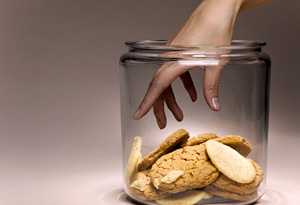The Cookie Burglar: How to Stop Binge Eating

Photo: Thinkstock/Photodisc
You can lock up dessert, but you won't lose weight until you find out what your fat wants to tell you. Women, Food and God author Geneen Roth explains.
A few years ago, I worked with a woman who had decided to stop her nighttime bingeing by locking her food in cabinets and giving her husband the key. "It sounded like a perfect plan," she said, "until I spent the hours after my husband went to sleep searching through his pockets, his drawers and his briefcase hunting for the key. When I couldn't find it, I'd take safety pins and tiny screwdrivers and I'd work the lock until it opened. I felt like a thief with a pounding heart and sweaty hands, frantically trying to get to the stash of diamonds before the owners came home. When I finally got to the cookies and cakes, I'd eat most of them, put the locks back on, and, in the morning, pretend nothing had happened." I hear stories like this every day from people who tell me they are longing to feel better about themselves and that the extra weight they are carrying is ruining their lives. And then, like the Cookie Burglar, they spend most of their free time planning a binge, bingeing and feeling awful afterward. (You probably have your own version of binge burglary.)
At some point, you have to ask yourself what's going on when it seems as if you'd give your right arm to lose weight and then find yourself breaking locks at 3 in the morning to get to the coffee cake.
Clue: The answer is not that you are crazy, lacking in willpower or forever doomed to having thunder thighs. Despite all evidence to the contrary, there are always exquisitely good reasons you turn to food when you're not hungry.
Take a moment right now. Consider these three questions:
- How is my apparently crazy eating benefiting me?
- If I were eating for exquisitely good reasons, what would those reasons be?
- And finally, if my weight/bingeing could talk, what would it say?
Regardless of how it may appear, what we do really does make sense. Our actions—especially with food—are inherently sane. In fact, they are expressions of our brilliance at getting our needs met.
Emotional eating is a language of its own, like hieroglyphics or Braille. Instead of trying to understand it, we're more likely to try to ignore it or shut it up. But we can't rid ourselves of emotional eating until we listen to what it has to say. Our relationship with food is expressing a true need, so unless we learn what it's trying to tell us, permanent weight loss will be impossible. Once we "get it" and understand the needs that food fulfills, emotional eating, having served its purpose, will stop.
How your fat can actually help you



